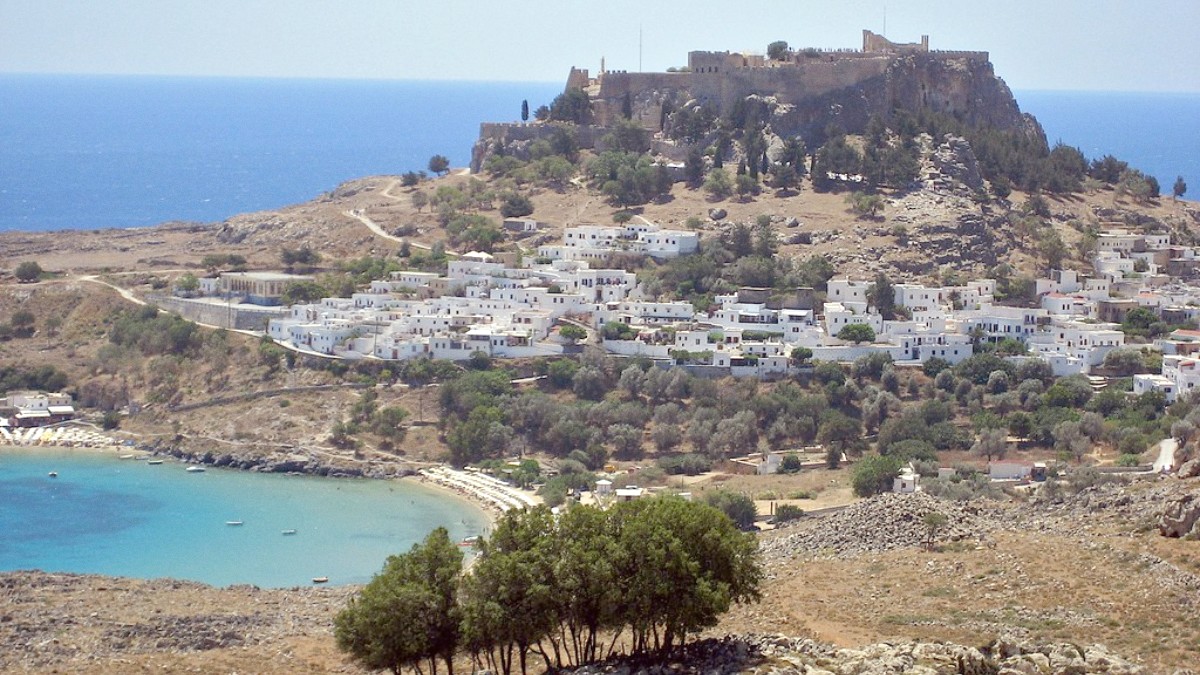
Dodecanese, Greece
June to August (Summer): These are the hottest months, with average temperatures frequently exceeding 30°C (86°F) and reaching up to 35°C (95°F). High humidity can make the heat feel more intense. Rainfall is rare during this period. Strong northerly winds, known as Meltemi, offer some relief, notably along coastal areas, making the summer heat more tolerable.
Shoulder Seasons (April, May, September, October): These months bring pleasant temperatures, generally ranging from 20°C to 28°C (68°F to 82°F). Humidity is lower compared to peak summer. Light rainfall is possible, especially in October, but sunny days prevail.
Significantly fewer tourists allow for an authentic local experience without crowds. Accommodation prices are at their lowest. The landscapes are lush and green after winter rains. This period is suitable for cultural exploration and enjoying the town's atmosphere at a relaxed pace.
Many tourist-oriented businesses, especially hotels and restaurants outside the main town, are closed. Ferry schedules are limited. Cooler weather and frequent rain can limit beach activities.
Late June - Early September
Guaranteed hot, sunny weather; all tourist services open.
Crowded attractions; highest prices; intense heat.
April-May, Mid-September - October
Pleasant temperatures; fewer crowds; lower prices.
Some smaller businesses may close late October; cooler evenings.
Meltemi Winds, Sea Conditions
Welcome cooling breeze in July/August.
Choppy sea conditions; windy beaches.
July and August offer the warmest sea temperatures. June and September also provide excellent conditions with slightly fewer crowds.
April, May, late September, and October bring comfortable temperatures for walking and exploring the UNESCO World Heritage site without intense summer heat.
Best for swimming and beach time.
Flowering landscapes, ideal for outdoor pursuits.
Sea still warm, pleasant for walks.
Cultural exploration without crowds.
Best in April, May, October.
Greece is a member of the Schengen Area, impacting visa requirements for various nationalities.
Citizens from countries like the USA, Canada, UK, Australia, New Zealand, and all EU member states do not require a visa for stays up to 90 days within any 180-day period. This applies to tourism or business travel.
Travelers from countries not listed as Schengen visa-exempt may need a Schengen visa. Application submission occurs at the Greek embassy or consulate in your home country.
Dial 112 for all emergencies in Greece. The main public hospital is General Hospital of Rhodes ("Agios Pavlos"). Pharmacies are easily found, identifiable by a green cross sign, offering advice for minor ailments.
The official currency in Greece, including Rhodes Town, is the Euro (€, EUR).
ATMs are widely available throughout Rhodes Town from major banks. Major credit and debit cards (Visa, Mastercard) are broadly accepted in hotels, restaurants, and larger shops. Carry some cash for smaller purchases, street food, and local markets.
Inform your bank about your travel plans to prevent card issues. Exchange offices are available but often offer less favorable rates than ATM withdrawals.
Daily Costs: €40 - €70 per day (excluding flights and major excursions).
Hostel bed, street food, public transport, free attractions.
Limited paid entries, no fine dining or private transfers.
Daily Costs: €80 - €150 per day (excluding flights and major excursions).
3-star hotel, mid-range tavernas, mixed transport, guided tours.
Occasional taxis or shared car, but not daily private transport.
Daily Costs: €200+ per day (excluding flights and major excursions).
4-5 star hotels, fine dining, private transfers, exclusive experiences.
Budget constraints do not apply; full freedom with choices.
| Category | Budget | Mid-Range / Luxury |
|---|---|---|
| Accommodations (per night) | €15-€60 | €60-€400+ |
| Meals (per person) | €3-€20 | €20-€50+ |
| Transportation (one-way) | €1.20-€6.50 (bus) | €5-€70 (taxi/rental car) |